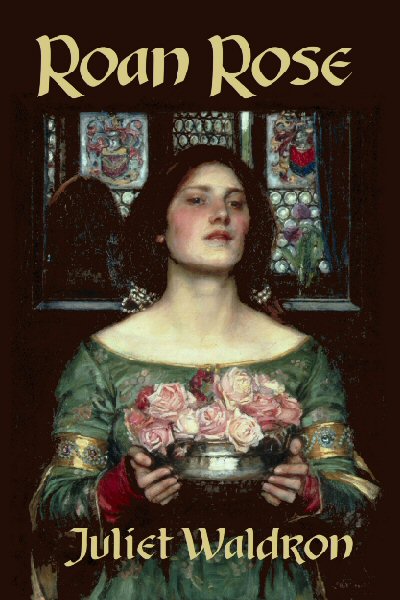Publication Date: October 1, 2013
Books We Love, Ltd.
Formats: eBook, Paperback
Genre: Historical Fiction
READ AN EXCERPT.
Loyalty Binds Her.
More like a gangland war for turf and loot than chivalry, the War of Roses disrupted the life of the English commoners for hundreds of years. Roan Rose is the story of one of them, a girl born on the Yorkshire dales. When the Countess of Warwick decides to take sturdy, gentle Rose to Middleham Castle to be companion and bed-time poppet for her youngest daughter, Anne, her fate is changed forever. Rose bears intimate witness to the passions, betrayals, battles and all the reversals of fortune which will shape her lady’s life—and her own. Anne Neville will briefly become a Queen, and Richard, Rose’s secret love, will become a King, one whose name has become synonymous with evil. When her King is betrayed and slain at Bosworth Field, Rose returns to a peasant’s hard life. She has one final service to perform.
Watch the Book Trailer
Praise for Roan Rose
"a beautiful story of love and loyalty set during the tumultuous reign of Richard III"
"I loved the strength of this woman"
"This author has a powerful sense of Time and Place"
"Waldron certainly knows her history…Yet despite its accuracy … Roan Rose is ultimately a book about character".
Buy the Book
Amazon (US) eBook
Amazon (US) Paperback
Amazon (AUS) eBook
Amazon (CAN) eBook
Amazon (UK) eBook
Amazon (UK) Paperback
Publication Date: October 26, 2013
Books We Love, Ltd.
eBook; ASIN: B00G8OYHFG
Genre: Historical Romance
To help her impoverished family, Sophie agrees to marry a wealthy older man in far off America. Less than twenty-four hours after she arrives in German's Mill, Pennsylvania, events have taken a far stranger turn than anything she could have imagined.
Set in Post-Civil War Pennsylvania, this tale of an arranged marriage gone wrong is as much family saga as it is a romance. Sophie is a sensitive young woman trying to make sense of her past and to understand the unfamiliar ways of her new homeland. Karl Joe is not only a veteran of the great war, but scarred by the secret violence of his privileged childhood. How they learn to trust each other and how they discover love is the beating heart of this old time story.
Buy the Book
Amazon (US) eBookAmazon (AUS) eBook
Amazon (CAN) eBook
Amazon (UK) eBook
Publication Date: September 9, 2012
Books We Love, Ltd.
eBook; ASIN: B0098CSH5Q
Genre: Historical Romance
READ AN EXCERPT.

Angelica is a Patriot heiress, stalked by a brutal, fortune-hunting British officer. Forced to trust Jack, the mystery man who pledges to take her on a dangerous war-time journey to her Albany home, she expects to encounter brigands, Tories and Indians. What she doesn’t expect is to lose her heart along the way.
Praise for Angel's Flight
Amazon (CAN) eBook
Amazon (UK) eBook
Publication Date: September 9, 2012
Books We Love, Ltd.
eBook; ASIN: B0098CSH5Q
Genre: Historical Romance
READ AN EXCERPT.
Angelica is a Patriot heiress, stalked by a brutal, fortune-hunting British officer. Forced to trust Jack, the mystery man who pledges to take her on a dangerous war-time journey to her Albany home, she expects to encounter brigands, Tories and Indians. What she doesn’t expect is to lose her heart along the way.
Praise for Angel's Flight
"It's quite a journey. If you like detailed historical novels, road romances, and war stories, then Angel’s Flight is for you." -IRRS @ Amazon
"This story has heart… " -Linda @ Romance Studio
"I found Juliet Waldron's attention to detail and historical accuracy refreshing and entertaining...a unique voice … Readers will be transported to a time of peril, divided loyalties and intrigue as Angelica triumphs over threats and danger." -Southern Gal @ Amazon
Buy the Book
"This story has heart… " -Linda @ Romance Studio
"I found Juliet Waldron's attention to detail and historical accuracy refreshing and entertaining...a unique voice … Readers will be transported to a time of peril, divided loyalties and intrigue as Angelica triumphs over threats and danger." -Southern Gal @ Amazon
Buy the Book
"Not all who wander are lost." Juliet Waldron earned a B. A. in English, but has worked at jobs ranging from artist's model to brokerage. Thirty years ago, after the boys left home, she dropped out of 9-5 and began to write, hoping to create a genuine time travel experience for herself--and for her readers. She loves her grand-girls and her kitties, likes to take long hikes, and reads historical/archeological non-fiction as well as reviewing for the Historical Novel Society. For summer adventure, she rides behind her husband of 50 years on his "bucket list" (black, and ridiculously fast) Hyabusa motorcycle.
You can find more information at www.julietwaldron.com or connect with Juliet on Facebook.
Juliet Waldron Blog Tour Schedule
Monday, October 6
Spotlight at Caroline Wilson Writes
Monday, October 13
Spotlight at Flashlight Commentary
Wednesday, October 29
Review at Book Nerd (Hand-Me-Down Bride)
Monday, November 3
Review at History From a Woman's Perspective (Roan Rose)
Thursday, November 6
Spotlight at Historical Fiction Connection
Monday, November 10
Review at 100 Pages a Day - Stephanie's Book Reviews (Roan Rose)
Saturday, November 15
Guest Post at Romantic Historical Lovers
Tuesday, November 18
Review at TeacherWriter (Roan Rose)
Monday, November 24
Review at Book Nerd (Roan Rose)
Tuesday, November 25
Guest Post at TeacherWriter (Roan Rose)
Thursday, November 27
Spotlight at Let Them Read Books
GiveawayTo win a $20 Amazon Gift Card please complete the Rafflecopter giveaway form below. Giveaway is open to US residents only.
a Rafflecopter giveaway
You can find more information at www.julietwaldron.com or connect with Juliet on Facebook.
Juliet Waldron Blog Tour Schedule
Monday, October 6
Spotlight at Caroline Wilson Writes
Monday, October 13
Spotlight at Flashlight Commentary
Wednesday, October 29
Review at Book Nerd (Hand-Me-Down Bride)
Monday, November 3
Review at History From a Woman's Perspective (Roan Rose)
Thursday, November 6
Spotlight at Historical Fiction Connection
Monday, November 10
Review at 100 Pages a Day - Stephanie's Book Reviews (Roan Rose)
Saturday, November 15
Guest Post at Romantic Historical Lovers
Tuesday, November 18
Review at TeacherWriter (Roan Rose)
Monday, November 24
Review at Book Nerd (Roan Rose)
Tuesday, November 25
Guest Post at TeacherWriter (Roan Rose)
Thursday, November 27
Spotlight at Let Them Read Books
GiveawayTo win a $20 Amazon Gift Card please complete the Rafflecopter giveaway form below. Giveaway is open to US residents only.
Giveaway ends at 11:59pm on November 30th. You must be 18 or older to enter.
Winner will be chosen via Rafflecopter on December 1st and notified via email.
Winner have 48 hours to claim prize or new winner is chosen.
Winner will be chosen via Rafflecopter on December 1st and notified via email.
Winner have 48 hours to claim prize or new winner is chosen.
a Rafflecopter giveaway















